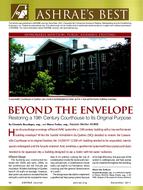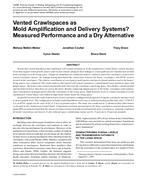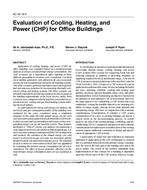Thermal Energy Storage (TES) technologies may be considered as a useful tool in reducing the cooling load requirement of modern engineering systems.This is achieved by means of spreading the daytime workloads over an entire 24-hour period, in order to utilise the earths naturally occurring ambienttemperature differences.
The night-time cooler ambient can be used to charge the latent heat capacity of various ” Positive Temperature Eutectic” solutions between +4°C (39°F)and +117°C (242°F) without the use of any refrigeration machinery by simply allowing the surrounding air to freeze these solutions. It is then possiblelater for the stored energy by the Positive Eutectic Thermal Energy Storage “PETES”, to be released back to the occupied space during daytime tohandle the heat gains.
This technique is generally called Passive Cooling and it may enable the charging process to take place by means of free cooling, i.e. without running thechillers and as a result becomes a very economical and environmentally friendly system. Furthermore, PETES opens new opportunities to explore heatbalance for the existing and new systems, which could offer significant overall system efficiency improvements.
Privatisation has created a new kind of energy market whereby the period of energy usage and the type of energy used is becoming the main criteria forprice structuring rather than overall energy consumption. Hence, cooling systems must be designed to provide sufficient flexibility for load shifting and aPETES Thermal Energy Storage technique can be considered as a useful tool to achieve this aim.
This paper is extended to investigate the Passive Cooling TES systems in the form if Eutectic PETES Solutions. The results of performance tests forvarious temperature ranges as well as the practical application guidance are also incorporated as part of this paper.
Citation: Second International Conference on Energy and Indoor Environment for Hot Climates, Doha, Qatar, February 2017
Product Details
- Published:
- 2017
- Number of Pages:
- 8
- Units of Measure:
- Dual
- File Size:
- 1 file , 4.8 MB
- Product Code(s):
- D-HCC17-24


